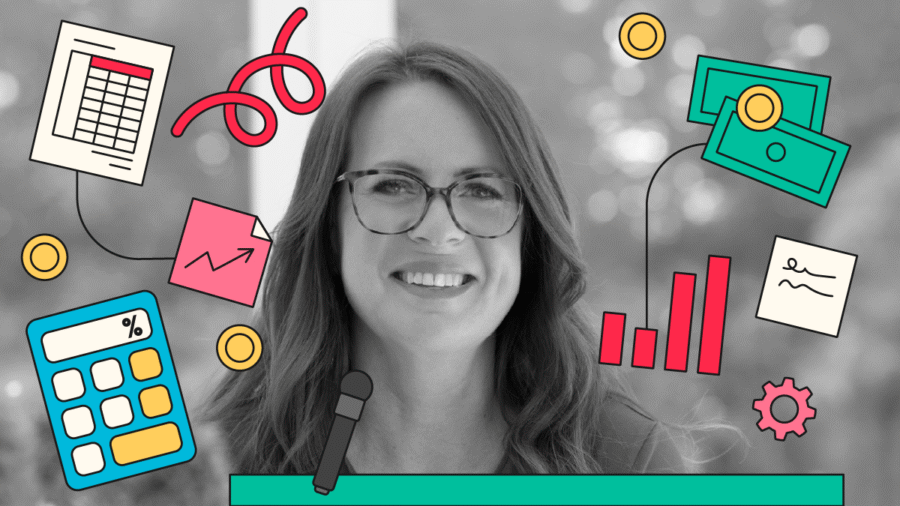
Laura Linden is a powerhouse. A financial strategist, fractional CFO and the founder of Feisty FD, an organisation aimed at helping SMEs strengthen their finances and prepare for high-value exits. A CIMA-qualified accountant with a law degree, Linden has spent over 15 years uncovering hidden cash, streamlining operations and building profitable growth strategies for small and mid-sized businesses.
Her path to finance leadership has been far from traditional. Once on track to become a professional ballerina, a car accident at 19 changed her trajectory. After pivoting from law to accounting, she built her career across FMCG, retail and the legal sector before moving into portfolio work, supporting between 20 and 30 companies over the past 16 years.
Now, through her book UnF** Your Business Finances, and her forthcoming Feisty FD app, Linden is tackling the issue of financial literacy head-on. Her mission is to help women, entrepreneurs and families overcome the fear and stigma around money, empowering them to take control of their financial futures.
Here, she discusses what it means to redefine the modern CFO role, why money mindset matters as much as spreadsheets and how financial literacy can change lives.
How did you become a CFO?
My path was definitely different from most. I qualified as an accountant in 2009 then, two years later, I had my son. At that point, I was a financial controller and really wanted to keep working, but I didn’t want to miss him growing up. So I decided to work part-time and freelance instead of taking a full-time corporate job.
That led me to small businesses that needed part-time finance help. Usually I was their only finance person. I was invited into board meetings early on because they wanted financial input and that gave me access to strategic conversations far earlier than most finance professionals get. I loved being part of those discussions. Looking back, it turned out to be one of the best decisions I ever made. I eventually got my first CFO role in 2016.
What skills or traits does a good finance leader need?
Strategic thinking is a big one. As accountants, we’re trained to be precise and structured, but CFOs need to step back and think about the bigger picture. They should consider how decisions affect growth, not just cost. You also have to see things from the business owner’s perspective, which can be difficult, but making that switch in your head is an important step toward achieving a goal.
Communication is just as important. Business owners don’t always speak in finance terms, so I make a conscious effort to use plain English and avoid a lot of accounting jargon. I’ll stop sometimes in a conversation to make sure everyone understands what we’re talking about because real dialogue only happens when people feel comfortable asking questions.
Integrity is another non-negotiable. The business owners I work with have to know I’m acting in their best interests. I’m very open about value and I want all my clients to know I’m using their data the right way to achieve the best results possible.
What excites you most about your current role?
It’s definitely the entrepreneurs who have created a business that they’ve poured blood, sweat and tears into. It’s almost like their baby. Being able to come in and transform the way they work is incredibly rewarding. I help them simplify tasks, show them what’s missing and ways to improve processes and cash flow.
My favorite moments are during exits. Watching someone sign the papers after years of hard work and knowing they’ve achieved what they set out to do. It’s such a privilege to be part of that journey.
What’s the biggest challenge facing your sector right now?
Cashflow pressure. Many of the businesses I work with serve large clients and those big companies can be slow to pay outstanding invoices. They use long payment terms that just don’t work for small businesses trying to manage payroll and overhead.
Access to funding can also be hard in the UK and the current uncertainty in the markets doesn’t help. Everyone is waiting to see what happens before making big decisions, which slows everything down and makes forecasting much harder.
What single thing would make your job easier?
Two things come to mind. First, I wish everyone had a baseline of financial literacy. It would make conversations faster and collaboration much smoother. There’s still a lot of shame and fear around talking about money, especially in the UK, where it’s considered rude or too personal.
The second is data quality. Technology is improving, but if the data going in is rubbish, the reports coming out will be too. I spend a lot of time helping clients understand why good data matters because accurate information drives better decisions.
What bit of business advice governs the way you work?
‘Don’t chase growth for the sake of ego.’ It’s easy to get caught up in revenue targets and headcount increases, but growth that isn’t profitable will eventually burn you out. I encourage founders to focus on sustainable, profitable growth. The kind that supports their goals instead of draining them. We need to focus on all the boring stuff first so we can lay a good foundation for growth afterward.
What book do you think every finance leader should read at least once?
The Psychology of Money: Timeless Lessons on Wealth, Greed and Happiness by Morgan Housel is one of my favorites. It explains how our childhood experiences shape our relationship with money and it’s brilliant for understanding the emotional side of finance.
I also love Rich Dad Poor Dad by Robert Kiyosaki. It compares the mindset of an entrepreneur to that of a traditional employee and it really helped me understand how founders think and make decisions.
What do you do outside of work to protect yourself from burnout?
Honestly, I’m not great at switching off because I care so deeply about my clients and their businesses. But my husband is incredible at helping me find balance. He has this sixth sense for when I’m overwhelmed. He’ll appear with a cup of tea or suggest a walk with our two rescue dogs. He’s the reason I don’t burn out. I wish I could switch off as easily as he can, but I also think my passion is part of what makes me good at what I do.
What has been your proudest achievement so far?
Writing my book, without a doubt. I’ve helped clients achieve some incredible things with business growth, acquisitions and exits – the book was something I did just for me. It was a passion project that took nine months, a lot of self-doubt and some tears along the way, but it’s been worth it. Early readers say it’s full of practical advice they didn’t know before, which makes me really proud.
If you weren’t a CFO, what would you be doing instead?
Something educational, definitely. Probably financial training for adults and small business owners. A big part of my job is explaining finance in plain language, so teaching others how to take control of their money would feel like a natural extension.

Laura Linden is a powerhouse. A financial strategist, fractional CFO and the founder of Feisty FD, an organisation aimed at helping SMEs strengthen their finances and prepare for high-value exits. A CIMA-qualified accountant with a law degree, Linden has spent over 15 years uncovering hidden cash, streamlining operations and building profitable growth strategies for small and mid-sized businesses.
Her path to finance leadership has been far from traditional. Once on track to become a professional ballerina, a car accident at 19 changed her trajectory. After pivoting from law to accounting, she built her career across FMCG, retail and the legal sector before moving into portfolio work, supporting between 20 and 30 companies over the past 16 years.
Now, through her book UnF** Your Business Finances, and her forthcoming Feisty FD app, Linden is tackling the issue of financial literacy head-on. Her mission is to help women, entrepreneurs and families overcome the fear and stigma around money, empowering them to take control of their financial futures.





